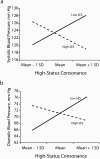Symbolic capital, consumption, and health inequality
- PMID: 21164087
- PMCID: PMC3020185
- DOI: 10.2105/AJPH.2010.193896
Symbolic capital, consumption, and health inequality
Abstract
Research on economic inequalities in health has been largely polarized between psychosocial and neomaterial approaches. Examination of symbolic capital--the material display of social status and how it is structurally constrained--is an underutilized way of exploring economic disparities in health and may help to resolve the existing theoretical polarization. In contemporary society, what people do with money and how they consume and display symbols of wealth may be as important as income itself. After tracing the historical rise of consumption in capitalist society and its interrelationship with economic inequality, I discuss evidence for the role of symbolic capital in health inequalities and suggest directions for future research.
Figures


Similar articles
-
Status, taste and distinction in consumer culture: acknowledging the symbolic dimensions of inequality.Public Health. 2008 Jun;122(6):631-7. doi: 10.1016/j.puhe.2007.09.011. Epub 2008 Jan 29. Public Health. 2008. PMID: 18234253
-
The cultural production of health inequalities: a cross-sectional, multilevel examination of 52 countries.Int J Health Serv. 2009;39(2):301-19. doi: 10.2190/HS.39.2.e. Int J Health Serv. 2009. PMID: 19492627
-
Social class, politics, and the spirit level: why income inequality remains unexplained and unsolved.Int J Health Serv. 2012;42(3):369-81. doi: 10.2190/HS.42.3.a. Int J Health Serv. 2012. PMID: 22993959
-
Socio-economic status, forms of capital and obesity.J Gastrointest Cancer. 2012 Mar;43(1):3-7. doi: 10.1007/s12029-012-9366-5. J Gastrointest Cancer. 2012. PMID: 22297485 Review.
-
Gendering inequality: a note on Piketty's Capital in the twenty-first century.Br J Sociol. 2014 Dec;65(4):667-77. doi: 10.1111/1468-4446.12114. Br J Sociol. 2014. PMID: 25516345 Review.
Cited by
-
Unpacking the role of financial literacy in the debt-mental health nexus: evidence from China.Front Public Health. 2025 May 7;13:1563297. doi: 10.3389/fpubh.2025.1563297. eCollection 2025. Front Public Health. 2025. PMID: 40401073 Free PMC article.
-
Relative deprivation and its association with health indicators: Lower inequality may not improve health.SSM Popul Health. 2019 May 2;7:100381. doi: 10.1016/j.ssmph.2019.100381. eCollection 2019 Apr. SSM Popul Health. 2019. PMID: 31193087 Free PMC article.
-
Pathways linking relative deprivation to blood pressure control: the mediating role of depression and medication adherence among Chinese middle-aged and older hypertensive patients.BMC Geriatr. 2023 Jan 31;23(1):57. doi: 10.1186/s12877-023-03769-6. BMC Geriatr. 2023. PMID: 36721087 Free PMC article.
-
Mental health problems among economically disadvantaged adolescents in an increasingly unequal society: A Swedish study using repeated cross-sectional data from 1995 to 2011.SSM Popul Health. 2018 Aug 23;6:44-53. doi: 10.1016/j.ssmph.2018.08.006. eCollection 2018 Dec. SSM Popul Health. 2018. PMID: 30186936 Free PMC article.
-
Short-term lending: Payday loans as risk factors for anxiety, inflammation and poor health.SSM Popul Health. 2018 Jun 7;5:114-121. doi: 10.1016/j.ssmph.2018.05.009. eCollection 2018 Aug. SSM Popul Health. 2018. PMID: 29922711 Free PMC article.
References
-
- Adler NE, Rekhopf DH. U.S. disparities in health: descriptions, causes, and mechanisms. Annu Rev Public Health. 2008;29:235–252 - PubMed
-
- Adler NE, Boyce T, Chesney MA, et al. Socioeconomic status and health. The challenge of the gradient. Am Psychol. 1994;49(1):15–24 - PubMed
-
- Adler NE, Ostrove JM. Socioeconomic status and health: what we know and what we don't. Ann N Y Acad Sci. 1999;896:3–15 - PubMed
-
- Kawachi I, Kennedy BP. The Health of Nations: Why Inequality Is Harmful to Your Health. New York, NY: New Press; 2002
MeSH terms
LinkOut - more resources
Full Text Sources
Medical

